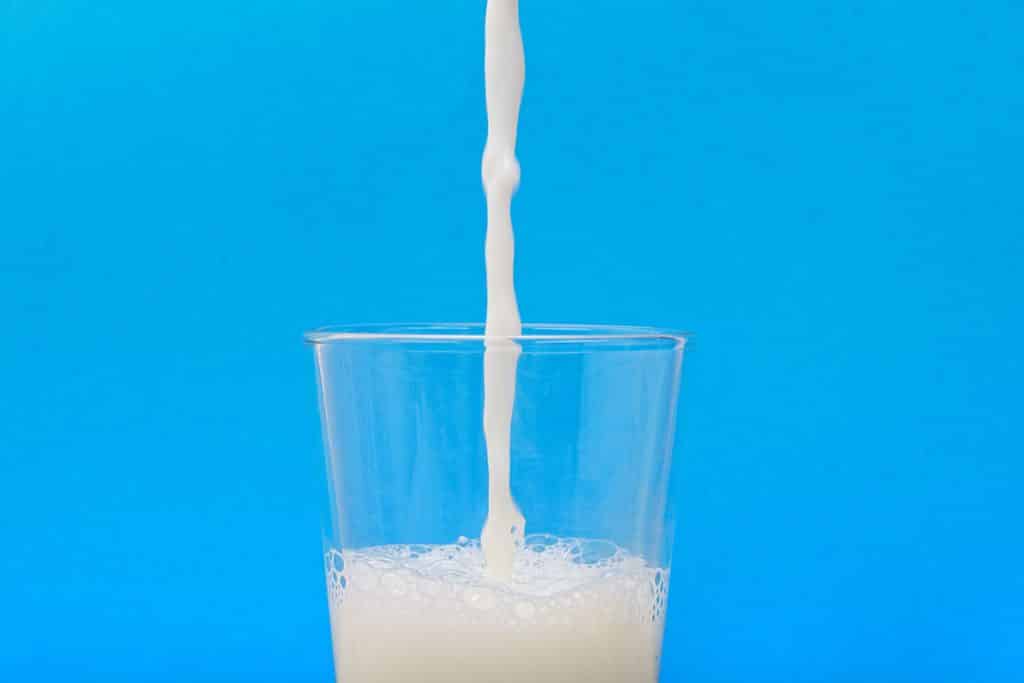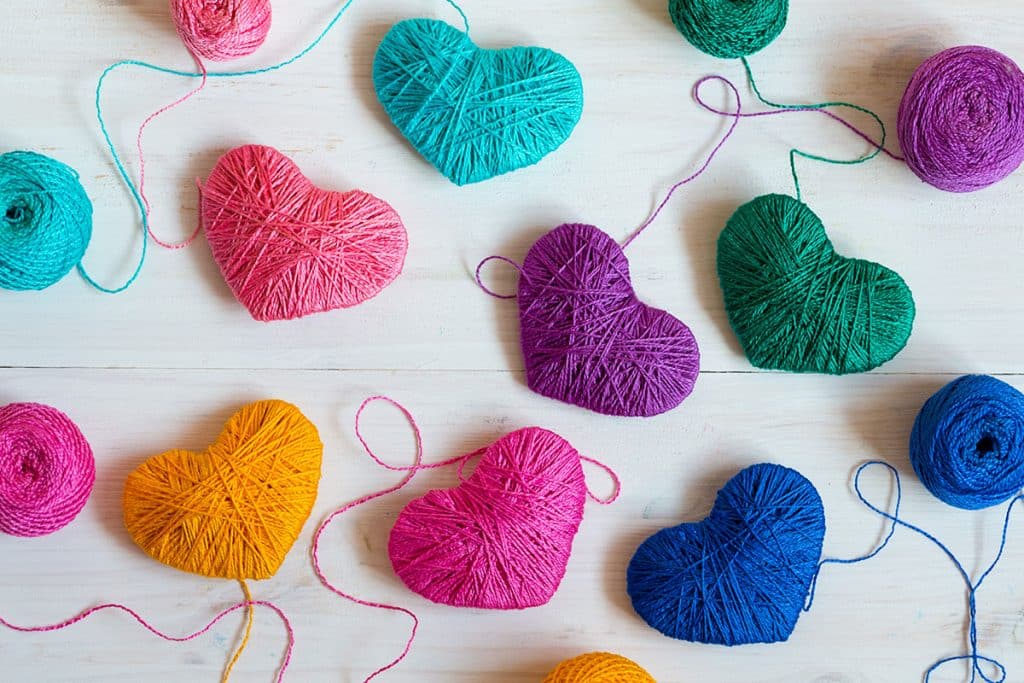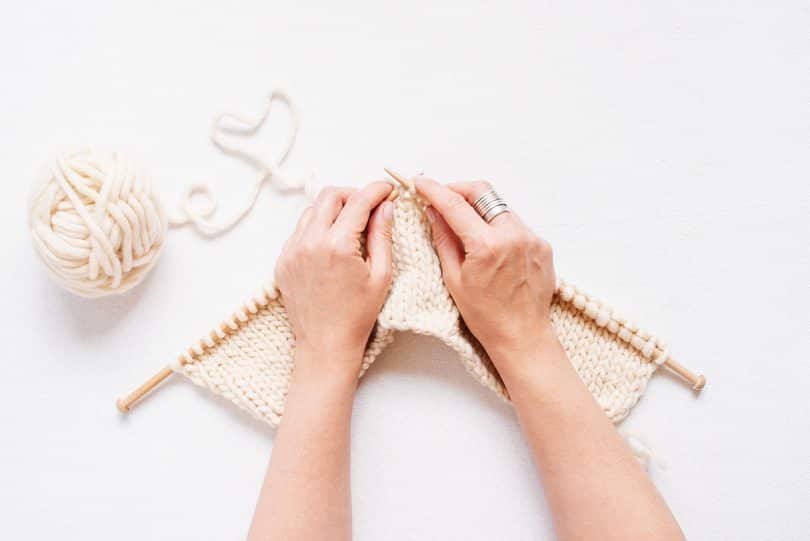When was the last time you had a bowl of cereal or a glass of milk for breakfast?
What if I told you that it could’ve been made into yarn?
Yep! You heard right. This semi-synthetic blend of yarn has the smooth, glossy features of silk and the strength of acrylic yarn.
But what is milk cotton yarn, exactly?
Update April 2022: The best selection is still on Etsy so make sure to check out their milk cotton marketplace.

The Yarn Spun from Spoiled Milk
There are a few kinds of milk cotton yarn: the synthetic blend made with acrylonitrile and its natural version made without acrylonitrile, which is far less common. (Only one company that I know of manufacturers milk fiber textiles of this sort and it’s expensive.)
Milk cotton yarn is a blend of milk fiber and cotton. You’ll sometimes find blends labeled “milk cotton” that also include acrylic or other synthetic materials. Textiles made from milk fiber certainly aren’t anything new, but our manufacturing process for this fiber has changed drastically.
The milk fiber in this yarn is produced from the casein (a milk protein) of skimmed milk. If you’re interested in the more technical aspects of how milk fiber is manufactured, this article has some great information.
In short, it’s incredibly resource-intensive and expensive, meaning it’s not efficient to make pure milk fiber yarn.
That’s where synthetic milk cotton and other similar blends come in. They take all the best features of the materials in that blend and combine it into a wonderfully soft, glossy, easy-to-work yarn that’s not prone to pilling. (Though it can be a little slippery, so it takes some adjusting!)
Is “Pure” Milk Cotton Yarn Eco-Friendly?
The short answer: yes, but only on a small scale.
Milk casein fiber production is certainly more eco-friendly than it was back in the 1930s when milk fiber was made with formaldehyde and the production process wasn’t profitable. It was only temporarily used as a substitute for wool, which had higher demand than supply, then replaced with cheaper synthetics like nylon.
Now, a company called Qmilk based in Germany has a patented process that produces milk casein fiber using none of the harmful chemicals found in older manufacturing processes.
Milk casein fiber production on a small scale isn’t a problem and can be beneficial if it’s utilizing wasted milk. Roughly 2 million tons of milk are disposed of every year…and that’s just in Germany.
So, if we were able to ensure that milk protein textiles were only being made from wasted milk, then yes, you might consider that eco-friendly.
Once demand exceeds that, it becomes a problem if companies try to keep up with that demand. Not all manufacturers can guarantee that they’ll have a steady supply of would-be wasted milk.
However, demand for milk fiber end products likely won’t rise too much—the end products are incredibly expensive.

How Does it Hold Up to Other Types of Yarn?
Milk cotton yarn is pretty amazing. (As it turns out, I’ve handled it without even realizing what it was!)
It’s silky soft (and more affordable than silk), as durable as most acrylic yarns, and doesn’t have as many issues with pilling as some other types of yarn.
Would I use it in most of my projects? Maybe smaller ones—it’s still difficult to find large amounts of the same batches in stock, so you might have issues with color variation.
But it’s perfect for smaller projects! Scarves, hats, gloves, and others that don’t require quite as much yarn as entire blankets are a great fit for milk cotton projects.
If you happen to be lucky enough to work with pure milk fiber yarn, it’s great for anything worn close to the skin, particularly around your neck. Super comfy and safe for your skin!
You can find some similar alternatives, like milk silk. There are also other blends that utilize a variety of other protein-based fiber yarns like wool, alpaca, cashmere, and others.
Most are a synthetic blend—”natural” milk yarn made with casein fibers, without the use of acrylonitrile in the production process is hard to come by. And with recent events, many companies who sell it are hindered by shortages and inability to get the product from their manufacturers.
How to Buy Milk Cotton Yarn
Milk cotton yarn is a little tricky to buy, to say the least. Especially when you have online retailers that aren’t quite sure what they’re selling.
Almost everything on Amazon is of the synthetic variety and you have to know what you’re looking for. (Or ask the sellers for their manufacturer’s details and contact them directly.)
The other problem is that, due to shortages and supplier changes, product details don’t always get updated and they wind up sending you another product. (Another reason to always contact the buyer beforehand.)
For the best quality products, you’ll find a few good listings on Etsy. I’ve found more of these are the typical 80% cotton, 20% milk fiber blend I struggled to find on larger sites.
You can do some hunting around in forums to see what everyone’s favorites are, but most are, unfortunately, sold out until manufacturers are fully back up and running again.
Alternatively, if you’re feeling adventurous, you could try spinning your own yarn from milk cotton fiber! It’s a little more widely available and I’ll be honest—dyeing is a lot of fun.
New to Knitting?
If you’re new to the knitting world (or just want to check out some of our favorite supplies, check out our post on knitting supplies for beginners or how to get started with Amigurumi.
Know a friend who’d like to join your new hobby? Share one of the hobbies here you think they’d love to start with you!












Thank you for this very helpful article. I recently purchased 2 bundles of yarns from an online retailer. One was advertised as acrylic and the other as milk cotton, which I expected to have a more cotton-like texture.
Now I understand why both feel like acrylic, and even have a skein in each that are the same, exact color. When I post my product reviews, I will ask the seller to disclose the real fiber content of both from now on.